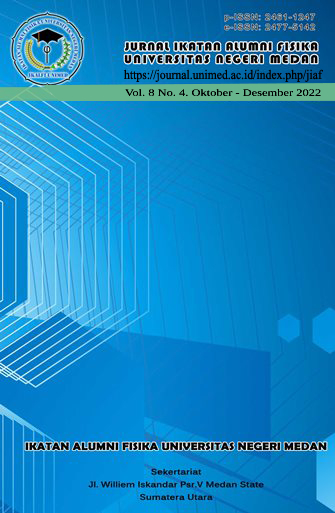Implementasi E-learning di Sekolah Menengah Kejuruan : Studi Kasus SMK Swasta PAB 12 Saentis
DOI:
https://doi.org/10.24114/jiaf.v8i4.41011Keywords:
learning outcomes, e-learning, mplementationAbstract
The SMK Center of Excellence program provides a way to be able to liberate the potential of teachers, principals, and students, as well as create a global standard diversity ecosystem. to see the impact of E-learning in schools on this research is limited to SMK Swasta PAB 12 Saintis, Deli Serdang North Sumatra. SMK Swasta PAB 12 Saentis is one of the 9 public and private vocational schools in North Sumatra developed by the Ministry of Education and Culture of the Republic of Indonesia through the Director General of Vocational Education to become a Center of Excellence in the Field of Hospitality in 2020. The approach used in the research is a qualitative approach, because researchers want to explore the development, application, and impact of using E-learning in Private Vocational Schools 12 PAB Saentis Qualitative research using qualitative methods, namely observation, interviews, or document review. student responses to E-learning that have been developed are obtained that elearning includes effective, productive, safe learning, and all students are satisfied with the use of e-learning in learning. The learning outcomes obtained by students before and after the use of e-learning have improved very well. The response from the interview results to all students was very positive towards the use of e-learning in the learning processReferences
Arsyad, Azhar.(2016) Media Pembelajaran . Jakarta: Rajawali Pers.
Boulton, H. 2008. Managing e-Learning: what are the Real Implications for Schools?. The Electronic Journal of e-Learning. Vol. 6(1): 11-18. available online at www.ejel.org.
Budisantoso, T. H, dan Budiarso, D. E. A. 2013. Pengembangan E-Learning. Yogyakarta: Deepublish
Dahiya, S., Jaggi, S., Chaturvedi, K.K., Bhardwaj, A., Goyal, R.C. and Varghese, C., 2016. An eLearning System for Agricultural Education. Indian Research Journal of Extension Education, 12(3), pp.132-135.
Empy Effendi, Hartono Zuang .2005. E-learning Konsep dan Aplikasi. Jakarta: Penerbit Andi Yogyakarta
Hakim, A.B., 2016. Efektifitas Penggunaan E-Learning Moodle, Google Classroom Dan Edmodo. I-STATEMENT: Information System and Technology Management (e-Journal), 2(1).
Muhammad, S., 2014. Efektivitas Pembelajaran Media E-Learning Berbasis Web Dan Konvensional Terhadap Tingkat Keberhasilan Belajar Mahasiswa (Studi Kasus Mahasiswa Fakultas Ekonomi Universitas Bina Darma Palembang). SNASTIKOM 2014, 1.
Rohmah, L., 2016. Konsep E-Learning Dan Aplikasinya Pada Lembaga Pendidikan Islam. An-Nur, 3(2).
Romisatriawahono. (2008). [online] Available FTP: http://www. romisatriawahono.net/2008/01/23. Tanggal akses: 6 Agustus 2016.
Sugiyono. 2010. Metode Penelitian Pendidikan Pendekatan Kuantitatif, kualitatif, dan R&D. Bandung: Alfabeta
Turino, Purwanto, Y. dan Soeleman, A. 2009. E-Learning Bahasa Inggris Berbasis web. Jurnal Teknologi Informasi. Vol. 5(2): 726-739.
Tafiardi. 2005. Meningkatkan Mutu Pendidikan Melalui E-Learning. Jurnal Pendidikan Penabur. Vol. 4(4): 85-97.
Waller, V. and Wilson, J. 2001. A definition for e-learning. TheODL QC Newsletter, pp. 1-2.
Wina Sanjaya. (2015). Perencanaan Dan Desain Sistem Pembelajaran, Jakarta: Prenadamedia Group.
Downloads
Published
Issue
Section
License
Copyright (c) 2022 JURNAL IKATAN ALUMNI FISIKA UNIVERSITAS NEGERI MEDAN

This work is licensed under a Creative Commons Attribution 4.0 International License.
Authors who publish with this journal agree to the following terms:- Authors retain copyright and grant the journal right of first publication with the work simultaneously licensed under a Creative Commons Attribution License that allows others to share the work with an acknowledgement of the work's authorship and initial publication in this journal.
- Authors are able to enter into separate, additional contractual arrangements for the non-exclusive distribution of the journal's published version of the work (e.g., post it to an institutional repository or publish it in a book), with an acknowledgement of its initial publication in this journal.
- Authors are permitted and encouraged to post their work online (e.g., in institutional repositories or on their website) prior to and during the submission process, as it can lead to productive exchanges, as well as earlier and greater citation of published work (See The Effect of Open Access).


 Jl. Williem Iskandar Psr. V, Medan Estate, Kec. Percut Sei Tuan, Kabupaten Deli Serdang, Sumatera Utara 20221
Jl. Williem Iskandar Psr. V, Medan Estate, Kec. Percut Sei Tuan, Kabupaten Deli Serdang, Sumatera Utara 20221